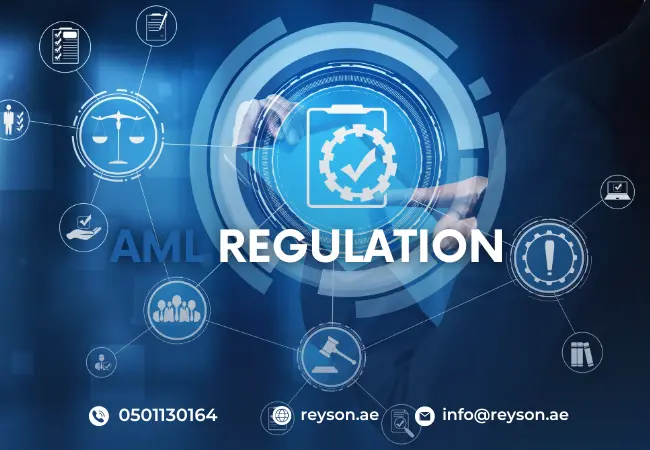
AML regulation services are important in today's financial world, since they try to prevent illegal actions like money laundering and terrorism funding. These services include customer due diligence, transaction monitoring, and suspicious activity reporting, all of which are aimed to assure regulatory compliance. AML regulation services enable financial institutions and businesses to reduce risks, maintain regulatory compliance, and protect the integrity of the financial system by utilizing innovative technology and experience.
As part of the UAE government's efforts to combat these financial crimes, AML/CFT regulations have been issued, backed up by detailed guidelines issued by various supervisory authorities, outlining the principles and best practices required to identify financial crime cases and mitigate risks. Here is a thorough guide on the UAE's Anti-Money Laundering (AML) regulations for DNFBPs.

The AML Regulation in UAE applies to financial institutions, banks, insurance companies, Designated Non-Financial Businesses and Professions, and Virtual Asset Services Providers (VASPs).
The main AML/CFT Regulations applicable are:
Aside from all of that, one must respect the following AML Regulation:
5. Maintaining Records
These steps help businesses in the UAE adhere to AML standards and therefore reduce financial crime risks.
According to FATF guidelines, the UAE requires businesses to implement a risk-based AML/CFT solution, which entails conducting risk assessments to determine the level of risk that particular customers present, and then implementing proportionate compliance measures. Therefore, UAE compliance solutions should include:
Customer identification: Companies must establish and verify their customers' identities through appropriate customer due diligence (CDD), gathering sufficient information to undertake an effective AML/CFT risk assessment. Similarly, businesses should establish ultimate beneficial ownership (UBO) of customer organisations in order to avoid the use of shell corporations and corporate structures to conceal customer identities.
Enhanced due diligence: When consumers are recognized as presenting a high AML risk, companies should execute enhanced due diligence (EDD), which involves a higher level of investigation, such as obtaining copies of official documents or conducting a third-party audit.
Transaction screening: Companies must screen customer transactions for AML risk on a regular basis, including transactions with high-risk counterparties or jurisdictions.
Sanctions and watchlists: Because UAE businesses face a higher level of sanctions risk, they must implement an efficient sanctions screening solution to detect designated consumers on international sanctions lists. Firms should also attempt to identify politically exposed persons (PEPs) by screening against PEP lists.
Choosing Reyson Badger for your AML Regulation Services means you're getting a team of experts who understand the complexities of compliance and are dedicated to protecting your business. We keep up with the latest regulatory changes and have a strong track record of helping businesses stay ahead of the AML requirements. Our customized solutions fit your unique needs, reducing risks and improving efficiency.
1. What is AML Regulation?
AML Regulation is laws and regulations aimed at preventing money laundering and terrorist financing.
2. Who must comply with AML Regulation in the UAE?
Banks, financial institutions, real estate companies, auditors, and designated non-financial businesses (DNFBPs).
3, What are the main AML reporting requirements?
Filing Suspicious Transaction Reports (STRs) and keeping customer due diligence (CDD) records.
5 .Which authority oversees AML Regulation in the UAE?
The Central Bank of the UAE and Financial Intelligence Unit (FIU) monitor compliance.